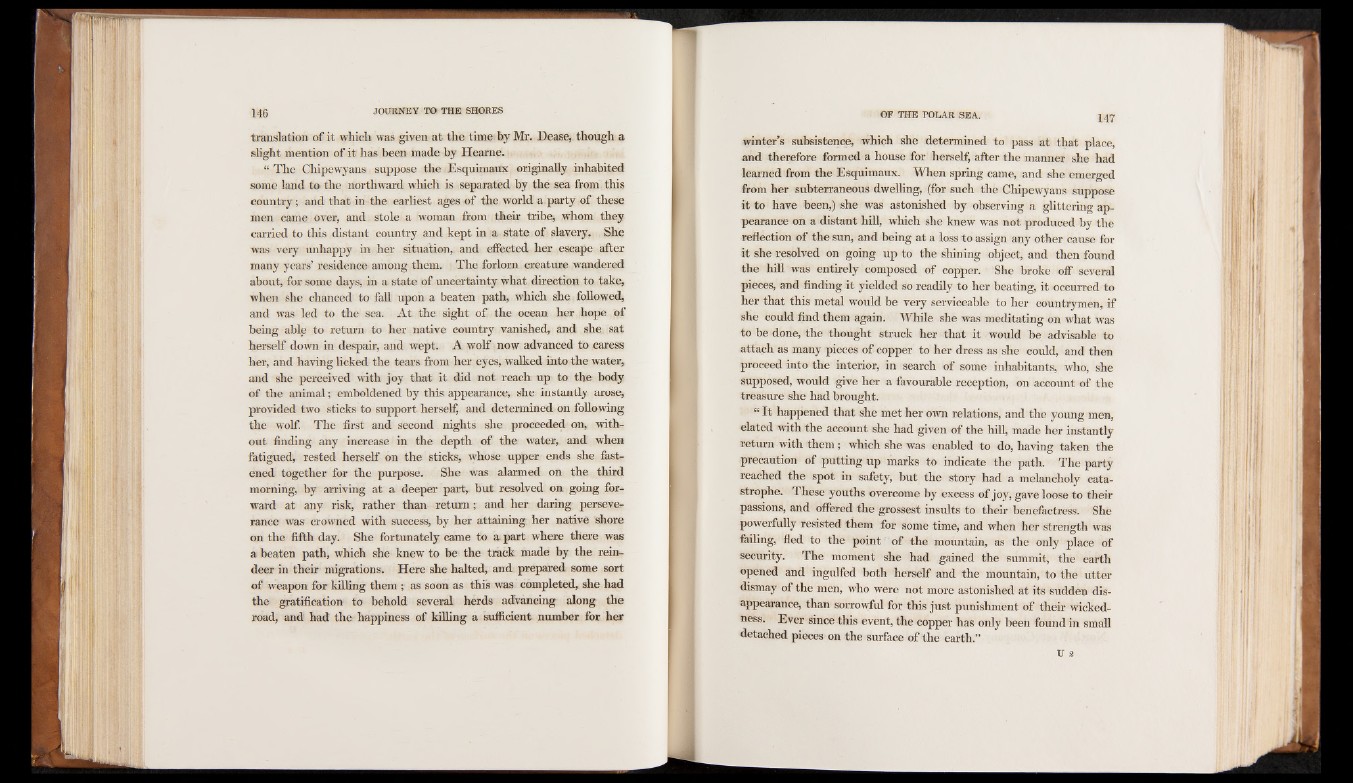
translation of it which was given at the time by Mr. Uease, though a
slight mention of it has been made by Hearne.
“ The Chipewyans suppose the Esquimaux originally inhabited
some land to the northward which is separated by the sea from, this
country; and that in the earliest ages of the world a party of these
men came over, and stole a woman from their tribe, whom they
carried to this distant country and kept in a state of slavery. She
was very unhappy in her situation, and effected her escape after
many years’ residence among them. The forlorn creature wandered
about, for some days, in a state of uncertainty what direction to take,
when she chanced to fall upon a beaten path, which she followed,
and was led to the sea. At the sight of the ocean her hope of
being able to return to her native country vanished, and she sat
herself down in despair, and wept. A wolf now advanced to caress
her, and having licked the tears from her eyes, walked into the water,
and she perceived with joy that it did not reach up to the body
of the animal; emboldened by this appearance, she instantly arose,
provided two sticks to support herselfj and determined on following
the wolf. The first and second nights she proceeded on, without
finding any increase in the depth of the water, and when
fatigued, rested herself on the sticks, whose upper ends she fastened
together for the purpose. She was alarmed on the third
morning, by arriving at a deeper part, but resolved on going forward
at any risk, rather than return| and her daring perseverance
was crowned with success, by her attaining her native shore
on the fifth day. She fortunately came to a part where there was
a beaten path, which she knew to be the track made by the reindeer
in their migrations. Here she halted, and prepared some sort
of weapon for killing them ; as soon as this was completed, she had
the gratification to behold several herds advancing along the
road, and had the happiness of killing a sufficient number for her
winter’s subsistence, which she determined to pass at that place,
and therefore formed a house for herself, after the manner she had
learned from the Esquimaux. When spring came, and she emerged
from her subterraneous dwelling, (for such the Chipewyans suppose
it to have been,) she was astonished by observing a glittering appearance
on a distant hill, which she knew was not produced by the
reflection of the sun, and being at a loss to assign any other cause for
it she resolved on going up to the shining object, and then found
the hill was entirely composed of copper. She broke off several
pieces, and finding it yielded so readily to her beating, it occurred to
her that this metal would be very serviceable to her countrymen, if
she could find them again. While she was meditating on what was
to be done, the thought struck her that it would be advisable to
attach as many pieces of copper to her dress as she could, and then
proceed into the interior, in search of some inhabitants, who, she
supposed, would give her a favourable reception, on account of the
treasure she had brought.
“ It happened that she met her own relations, and the young men,
elated with the account she had given of the hill, made her instantly
return with them; which she was enabled to do, having taken the
precaution of putting up marks to indicate the path. The party
reached the spot in safety, but the story had a melancholy catastrophe.
These youths overcome by excess of joy, gave loose to their
passions, and offered the grossest insults to their benefactress. She
powerfully resisted them for some time, and when her strength was
failing, fled to the point of the mountain, as the only place of
security. The moment she had gained the summit, the earth
opened and ingulfed both herself and the mountain, to the utter
dismay of the men, who were not more astonished at its sudden disappearance,
than sorrowful for this just punishment of their wickedness.
Ever since this event, the copper has only been found in small
detached pieces on the surface of the earth.”
U s